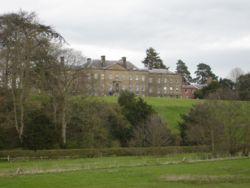
The victory last week in a referendum in the Wrecsam/Wrexham area proves that it is possible for local people to stand up against developers and win – at least in part.
The referendum, organised by Wrecsam Council, was held to decide the future of a proposed development by The National Trust on its Erddig Estate. The Trust had planned to build 223 homes on land that it manages for the people of Wales and on which stands Erddig Hall. However, a Local Resident's Committee and Cymuned, a Welsh housing and language vcampaign group, objected to the plans on the grounds that it was not wanted by the community.
The Rhostyllen Residents' Committee claimed the development would cause increased traffic, environmental damage, pressure on services and loss of local identity. With help from Cymuned, the Committee was able to persuade Wrexham Council to stage the referendum in the ward of Esclusham. 385 people voted against the development with 209 in favour and the referendum saw an unusually high 25% turn out. The campaigners are now hoping that The National Trust will withdraw their plans, who had previously claimed that the development had the support of the local community.
If The National Trust doesn't withdraw its plans, the application will go back to Wrecsam Council's Planning Committee for further scrutiny. However, in view of the referendum result, the Planning Committee will have to take The Trust's claims and proposals into very careful consideration.
Meanwhile Ceredigion Council has been criticised for approval planning applications, against the advice of planners, because the development proposals came from Welsh speakers. The Planning Inspector from the Welsh Assembly Government, Ian Osborne, said that it was "discriminatory" to approval plans on the basis of language only and Ceredigion Council's senior planning officer Aled Richards agreed. Richards said that the accusations should be taken seriously, because there was a risk that the Planning Committee could loose its planning powers for breach of regulations. Some Planning Committee members however disagreed. Cllr Lyndon Lloyd told BBC Wales that:
"We have assembly government ministers saying there should be policies in rural areas that rely on positive discretion, and then we have comments from Mr Osborne that seem so rigid... All we're trying to do is stand up for our young people and our communities. There seems to be a lack of awareness of that in Cardiff from the assembly's officials."
There is certainly an increasing pressure at a grassroots level in Wales for planners to listen to the voice of the community and in Welsh speaking areas especially local people are demanding that Councils take serious account of language issues when considering planning applications.
The Esclusham community referendum could point the way to those communities in Scotland, as previously reported in Celtic News, who also oppose the way National Trust Scotland manage the properties and land it also holds in trust for the people of Scotland.
(Report prepared for Celtic News by Rhisiart Tal-e-bot)
J B Moffatt Director of Information Celtic League
29/01/08
- Emmanuel Grégoire et l’abbé Macron par David Grosclaude le 23/11/2024
- Pays de Redon. La Bogue d’or, rendez-vous du « génie populaire » par Le blog de paul Molac le 05/11/2024
- Catherine Vautrin en Corse : Régions et Peuples Solidaires appelle l’Etat à enfin aboutir sur l'autonomie par RPS le 25/10/2024
- Gouvernement Barnier : des nominations inquiétantes par RPS le 24/09/2024
- Quelle future gouvernance en France ? par Marcel Berrou le 08/07/2024
- Après deux cycles de trois ans du Parlement de Bretagne réveillé, voici venir le troisième cycle ! par KAD le 01/07/2024
- Résolution pour la Réunification de la Bretagne à la XIXème Assemblée Générale de l'UNPO à Munich, les 11 et 12 mai 2024 : par KAD le 07/05/2024
- TER Nouvelle Aquitaine : quelle honte ! par David Grosclaude le 18/04/2024
- Les Braises de la Rencontre, le 5 mai 2024, sur le parc de sculptures mémorial de MAB Koad Sav Pell ! par MAB, Musée Archipel Breton le 16/04/2024
- Koun Breizh s’indigne : Non ! les festoù-noz ne sont pas des lieux réservés aux « attardés » ! par Koun Breizh - Bertaign Tenant - Mémoire-de-Bretagne le 07/01/2024
 The Celtic League has branches in the six Celtic Countries. It works to promote cooperation between these countries and campaigns on a broad range of political, cultural and environmental matters. It highlights human rights abuse, monitors all military activity and focuses on socio-economic issues.
TEL (UK) 01624 877918
MOBILE (UK)07624 491609
(voir le site)
The Celtic League has branches in the six Celtic Countries. It works to promote cooperation between these countries and campaigns on a broad range of political, cultural and environmental matters. It highlights human rights abuse, monitors all military activity and focuses on socio-economic issues.
TEL (UK) 01624 877918
MOBILE (UK)07624 491609
(voir le site)
